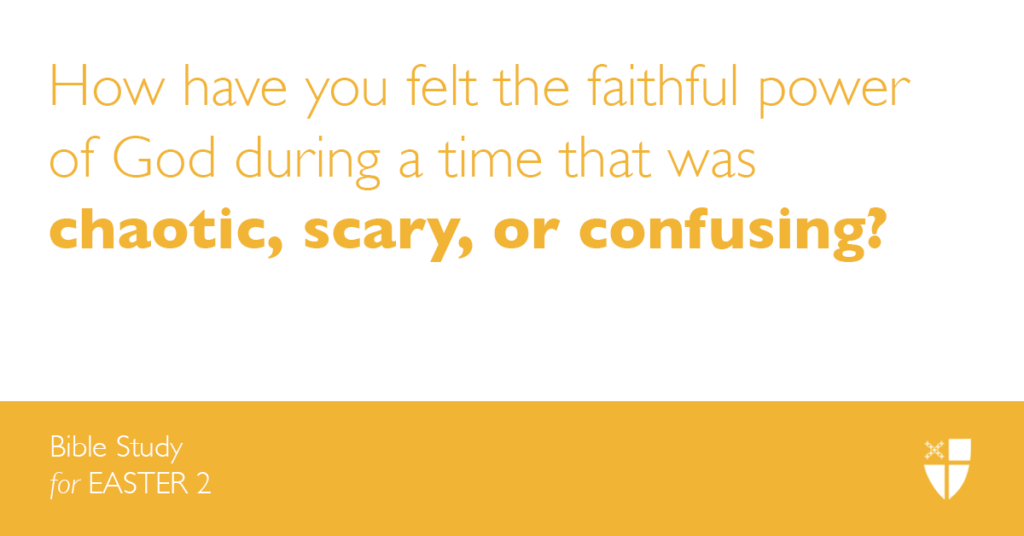This page is available in: Español
Bible Study: Easter 2 (C) – 2019
April 28, 2019

Acts 5:27-32
The Book of Acts was probably written by one of Paul’s companions, maybe his physician Luke, and is full of tales of divine intervention, miraculous conversions, and healings. The author seems to be saying, “We can carry on Jesus’s ministry!” In chapter 5, we hear about an encounter with the temple police, one way that Luke illustrates the broader animosity and threats facing the early Church. It was in the best interest of the temple police to keep Judaism the way it was, where they were in charge. Jesus had been crucified, and now they were trying to quash the remaining threads of his radical movement. The apostles were direct threats to their power.
While some call this book The Acts of the Apostles, it’s really a testament to the acts of God through the Holy Spirit and the Risen Jesus Christ. Luke attempts to wow the reader with stories of miracles and God’s continued mercy and faithfulness as the early Church experiences the growing pains of a movement trying to survive and grow without its leader. The response by the apostles in this scene reminds us that the movement, while threatened, is faithful, strong, and empowered by God. In fact, there’s a happy ending to this arrest story—via intervention by a sympathetic rabbi who spares the apostles from punishment.
- How have you felt the faithful power of God during a time that was chaotic, scary, or confusing?
- When have you come across animosity for something you believe in? How did you respond?
Psalm 118:14-29
Here in the second week of Easter, we are still in the thick of celebrating the resurrection of Christ. While the Psalms were written well before the birth of Jesus (probably by King David), themes of life and resurrection are found throughout. Psalm 118:17 says, “I shall not die, but live, and declare the works of the Lord.” It is not enough to toast the Risen Lord and then go about our days as if nothing has changed. With the knowledge of the good news—that life and love can defy death itself—we are charged to go out and declare the impact that God has on us. Hallelujah!
- Tell your story: how do you experience the resurrection today? In what ways has that changed you?
Revelation 1:4-8
The Book of Revelation functions as many things: a letter addressing specific issues, prophesy and warnings to follow God, apocalyptic narrative… a Christian prophet named John (not the apostle) wrote this letter to specific churches addressing their circumstances as members of a new expression of religion. There was tension between new Christians and the general population, both Romans and Jews, who considered Christians to be disloyal, unpatriotic, and antisocial for not participating in some of the local festivals and traditions. John’s letter to the seven churches attempts to bolster their faith by inspiring confidence, stirring up indignation for those who defy God, provoking repentance, and, as Mark Allan Powell puts it, “inspir[ing] praise for God from those who realize the Lord of history is worthy of their trust.”
John does this in part with apocalyptic images: God’s eventual victorious return puts the temporal and earthly struggles into a larger, more cosmic perspective. Remembering that we are loved and cherished by the Alpha and Omega makes it a little easier to stay committed to our faith in the face of tension today.
- What can you do to remember the “bigger picture” instead of being mired down in the small?
- What image of a triumphant God is most comforting or inspiring to you? (Is God “coming with the clouds”?)
John 20:19-31
In the days after the Crucifixion, the apostles were in a locked room, hiding from their enemies and trying to figure out their next steps. Jesus suddenly appears to them, and rejoices, prays, and blesses them. But Thomas was away, perhaps running an errand, picking up the milk and bread. He missed out.
Was he a “doubting Thomas?” Perhaps he was simply the unlucky Thomas, missing out on the coolest thing that had happened in centuries. Did he truly “doubt” Jesus’ resurrection when he heard about it from his friends? Perhaps he is shocked or scared or confused Thomas, in the middle of the cognitive dissonance that comes from trying to believe something impossible.
This story about Thomas is a quintessential lesson that God acts in ways which are unexpected and impossible. Faithful Christians today are called to believe in the Risen Christ without using our physical senses to experience Jesus’s resurrected body in the flesh. But in miracles big and small, Christ appears in ways which don’t make any sense to us and blows away our expectations. Jesus blesses us if we “have not seen and yet have come to believe” – even if what we believe is impossible.
- When have you been surprised by God’s presence?
- In what ways do you or do you not relate to Thomas?
This page is available in: Español
Don’t forget to subscribe to the Sermons That Work podcast to hear this sermon and more on your favorite podcasting app! Recordings are released the Thursday before each liturgical date.
Receive Free Weekly Sermons That Work Resources!
This page is available in: Español


